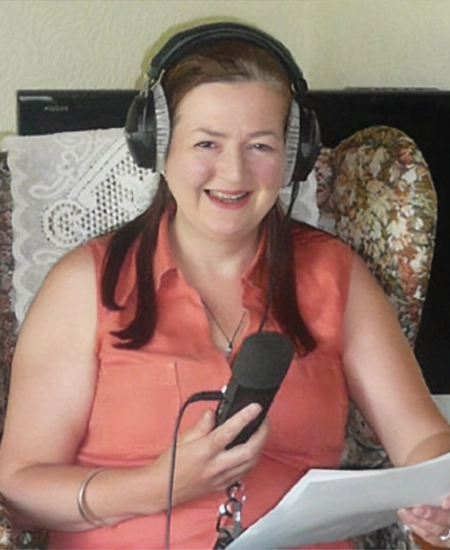< Back
| Poem | Vocabulary |
|---|---|
| A cudnae dae wioot ma tay, Tae stairt me aff maist ivery day, “A wee drap in yer haun”, the’ say, Wairm, wat an strang, Tha thang tae keep tha drouth at bay Tha hale day lang. Ma mammie larned me fae a wean Tae wairm tha pot an no pit tay in, Tae tha watter’s fairly plumpin, an Then ye dae it. “Ye teem tha watter owre tha tay, an There ye hae it.” “Them tay-bags irnae guid fur ocht”, ir “It’s aye tha loose tay we hae bocht”, ir “Yin spoon fur ivery boadie, dochter, An yin fur tha pot. An pit it doon fornent tha fire Tae keep it hot”. Noo maist fowk cannae be annoyed. The’r no parteeclar hoo it’s made The’ hinnae larned tae tak a pride In ocht daen richt. Och, it’s mair nor tay’s haes me dismayed — (A waesome sicht.) But nooadays, iz A wus sayin, A cannae thole tha wye it’s daen. Yir gien an empie bicker an, Ye mak yer brew, Wi pumpie flesk, taybag an spoon, T’wud gar ye grue. Tha hale thing is jist quare an reuch, Thon watter’s niver hot eneuch, Luks lik it cum strecht fae a sheugh, Tha brew’s aa gray. Gin thon’s “gan forrits”! A say ‘Yugh!” Fur thon’s no tay. | tay – tea ivery boadie – everybody cudnae dae wioot – could not do without wee drap in yer haun – a cup of tea served informally drouth – thirst wean – child watter – water plumpin – boiling ower – over ocht – anything bocht – bought dochter – daughter fornent – in front of parteeclar – particular hinnae – have not daen – done richt – right bicker – cup cannae – cannot gar ye grue – make you shudder quare an – very reuch – rough strecht – straight sheugh – drainage channel |
Games
Poem Analysis
This poem, by a living Ulster-Scots poet, is written in a metre called ‘Standard Habbie’, a form of verse attributed to Burns but also used by the older Scots poets Fergusson and Ramsay and by many minor poets since. It is called after Habbie Simpson (‘The Piper of Kilbarchan’) who lived from 1550 to 1620 and was the subject of a mock elegy written in 1640. It is a relatively easy metre for the poet and gives an impression of pace.
The title Tay is an old form of the word ‘tea’ which is still in daily use among native speakers of both Ulster-Scots and Ulster English, while it has largely died out in Great Britain. An example of its earlier use in English literature is found in Alexander Pope’s ‘The Rape of the Lock’ (Canto III, line 7), which was written in 1712 and reads:
“Here thou, great Anna! whom three realms obey, Dost sometimes counsel take – and sometimes tea”.
Although the word is written in the modern form, ‘tea’, it is clear that to rhyme with ‘obey’ it must instead be pronounced ‘tay’.
Spellings of Ulster-Scots words can sometimes be described as ‘eye-dialect’, which really means the words are written to indicate how they are said. An interesting example here is thang, the Ards Peninsula form of ‘thing’. It indicates a nasal pronunciation of short ‘i’ that is somewhere between an ‘i’ and an ‘a’.
Poet Bio
Fiona McDonald

Fiona was born and raised in Newtownards, where her father’s family have lived since at least the 1700s, and grew up hearing and using much of the language and speech patterns now recognised as Ulster-Scots.
She first discovered written Ulster-Scots when she borrowed a copy of WG Lyttle’s novel Betsy Grey from the library at Regent House School. Some years later, after hearing about Ulster-Scots through her work as a civil servant at the Department of Education, she was curious enough to register for Philip Robinson’s Ulster-Scots Language classes at “Ards Tech” and later at Ballyboley. It was through these classes that Fiona was encouraged to attempt some poetry and prose in Ulster-Scots, and her book Cowie’s Craig is a compilation of items produced for the class and for the Ulster-Scots Language Society’s publication Ullans.
Fiona is a former committee member of the Ulster-Scots Language Society and the Ulster-Scots Academy Implementation Group, and a former Director of the Ulster-Scots Community Network.
Other interests include genealogy, history and geography and music, plus various outdoor pursuits including running, hillwalking, swimming, horse-riding and stand up paddleboarding.